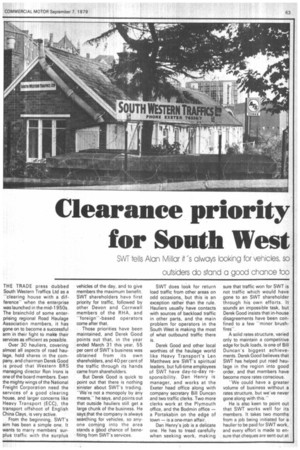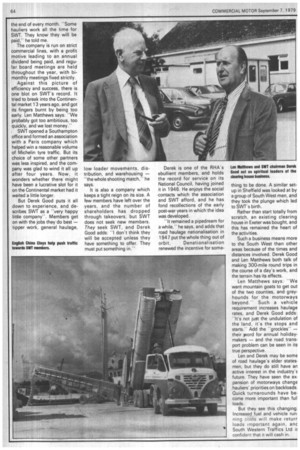Clearance priority for South West
Page 65

Page 66

If you've noticed an error in this article please click here to report it so we can fix it.
tells Alan Mikar it's always looking for vehicles, so outsders do stand a good chance too
THE TRADE press dubbed South Western Traffics Ltd as a "clearing house with a difference"' when the enterprise was launched in the mid-1950s. The brainchild of some enterprising regional Road Haulage Association members, it has gone on to become a successful arm in their fight to make their services as efficient as possible.
Over 30 hauliers, covering almost all aspects of road haulage, hold shares in the company, and chairman Derek Good is proud that Western BRS managing director Ron Irons is one of the board members. Even the mighty wings of the National Freight Corporation need the services of a good clearing house, and larger concerns like Heavy Transport (ECG), the transport offshoot of English China Clays, is very active.
From the beginning, SWT's aim has been a simple one. It wants to marry members' surplus traffic with the surplus vehicles of the day, and to give members the maximum benefit. SWT shareholders have first priority for traffic, followed by other Devon and Cornwall members of the RHA, and "foreign"-based operators come after that.
Those priorities have been maintained, and Derek Good points out that, in the year ended March 31 this year, 55 per cent of SWT's business was obtained from its own shareholders, and 40 per cent of the traffic through its hands came from shareholders.
But Derek Good is quick to point out that there is nothing sinister about SWT's trading. "We're not a monopoly by any means,he says, and points out that outside hauliers still get a large chunk of the business. He says that the company is always searching for vehicles, so anyone coming into the area stands a good chance of benefiting from SWT's services.
SWT does look for return load traffic from other areas on odd occasions, but this is an exception rather than the rule. Hauliers usually have contacts with sources of backload traffic in other parts, and the main problem for operators in the South West is making the most of what outbound traffic there is Derek Good and other local worthies of the haulage world like Heavy Transport's Len Matthews are SWT's spiritual leaders, but full-time employees of SWT have day-to-day responsibility. Dan Henry is manager, and works at the Exeter head office along with company secretary Bill Duncan and two traffic clerks. Two more clerks work at the Plymouth office, and the Bodmin office — a Portakabin on the edge of town — is a one-man affair.
Dan Henry's job is a delicate one. He has to tread carefully when seeking work, making sure that traffic won for SWT is not traffic which would have gone to an SWT shareholder through his own efforts. It sounds an impossible task, but Derek Good insists that in-house disagreements have been confined to a few "minor brushfires''.
A solid rates structure, varied only to maintain a competitive edge for bulk loads, is one of Bill Duncan's biggest achievements. Derek Good believes that SWT has helped put road haulage in the region into good order, and that members have become more rates conscious.
"We could have a greater volume of business without a rates structure, but we've never gone along with this."
He is also keen to point out that SWT works well for its members. It takes two months from a job being initiated for a haulier to be paid for SWT work, and every effort is made to ensure that cheques are sent out at the end of every month. "Some hauliers work all the time for SWT. They know they will be paid," he told me.
The company is run on strict commercial lines, with a profit motive leading to an annual dividend being paid, and regular board meetings are held throughout the year, with bimonthly meetings fixed strictly.
Against this picture of efficiency and success, there is one blot on SWTs record. It tried to break into the Continental market 13 years ago, and got its fingers burnt by being too early. Len Matthews says: "We probably got too ambitious, too quickly, and we lost money.. SWT opened a Southampton office and formed an association with a Paris company which helped win a reasonable volume of Michelin tyre traffic. But its choice of some other partners was less inspired, and the company was glad to wind it all up after four years. Now, it wonders whether there might have been a lucrative slot for it on the Continental market had it waited a little longer.
But Derek Good puts it all down to experience, and describes SWT as a -very happy little company". Members get on with the jobs they do best — tipper work, general haulage, low loader movements, distribution, and warehousing — -the whole shooting match," he says.
It is also a company which keeps a tight reign on its size. A few members have left over the years, and the number of shareholders has dropped through takeovers, but SWT does not seek new members. They seek SWT, and Derek Good adds: "I don't think they will be accepted unless they have something to offer. They must put something in.'' Derek is one of the RHA's ebullient members, and holds the record for service on its National Council, having joined it in 1946. He enjoys the social contacts which the association and SWT afford, and he has fond recollections of the early post-war years in which the idea was developed.
"It remained a pipedream for a while,he says, and adds that road haulage nationalisation in 1947 put the whole thing out of
orbit. Denationalisation renewed the incentive for some thing to be done. A similar setup in Sheffield was looked at by a group of South West men, and they took the plunge which led to SVVT's birth.
Rather than start totally from scratch, an existing clearing house in Exeter was bought, and this has remained the heart of the activities.
Such a business means more to the South West than other areas because of the times and distances involved. Derek Good and Len Matthews both talk of making 300-mile round trips in the course of a day's work, and the terrain has-its effects.
Len Matthews says: "We want mountain goats to get out of the two counties, and greyhounds for the motorways beyond.Such a vehicle requirement increases haulage rates, and Derek Good adds: "It's not just the undulation of the land, it's the stops and starts." Add the "grockles— their word for annual holidaymakers — and the road transport problem can be seen in its true perspective.
Len and Derek may be some of road haulage's elder statesmen, but they do still have an active interest in the industry's future. They have seen the expansion of motorways change hauliers' priorities on backloads. Quick turnarounds have become more important than ful loads.
But they see this changing Increased fuel and vehicle run• ning casts will make returr loads important again, anc South Western Traffics Ltd confident that it will cash in.












































































































































